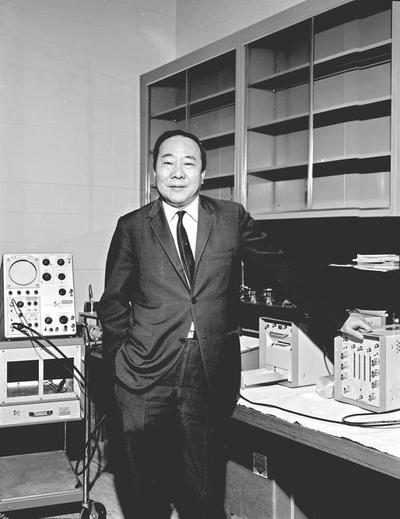Dublin Core
Title
Chih Wang Oral History Interview
Description
Dr. Chih Wang opens the interview with a description of his early childhood in Shanghai and Qingdao, in China. He lived with his father, who worked for the railroad, and his stepmother. He admits that he was a poor student until he entered university at Shandong, though he managed to get good grades. His university years were during the Sino-Japanese War, and in 1937 he was forced to evacuate along with his stepmother and half siblings. He relates his experiences fleeing Japanese bombers and travelling all over China and Indochina to escape the Japanese, find work, and try to continue his education. Rather than escaping to a safer part of the country, Wang chose to make a dangerous and difficult journey to attend university in China. He worked whatever jobs he could find and describes constantly having to be on the watch for Japanese bombers. He found a high-paying job in Hai Phong, in Indochina, but later gave it up when an opportunity arose to work as a research assistant at a university. His supervisor there eventually decided that it would be good for him to continue his education overseas, so he arranged for Wang to move to Oregon State College.
Wang’s application to emigrate to the U.S. was approved, and he travelled on a U.S. army transport vessel. The journey took 27 days and Wang realized that he did not have a working understanding of American slang, quipping that his vocabulary was about twenty years older than himself. Once he arrived in Corvallis, he took an examination to determine his qualifications and then was given a position at Oregon State as a teaching assistant. A year after moving to Corvallis, Wang was able to bring his wife to live with him. They both earned master’s degrees at Oregon State, but she became ill and passed away a few years later. Wang later earned his Ph.D. and remained at OSU until his retirement in 1984.
At OSU, Wang’s research focused on uses of radioisotopes. He was very involved in the effort to build a radiation center on campus to support research and teaching. He then lobbied to build a reactor as well, making OSU one of the few universities in the country housing a functioning nuclear reactor. He was likewise instrumental in the creation of the Department of Nuclear Engineering. In his retirement, Wang focused on supporting the American Nuclear Society. He concludes the interview by describing the impact of the environmental movement on the nuclear power industry, and admits that he worries what will happen if the country does not have a strong nuclear power industry in the event of an energy crisis.
Chih H. Wang was born in Shanghai, China in 1917, and immigrated to the United States in 1945. He earned his Ph.D. in organic chemistry from Oregon State College in 1950 and remained on faculty there for the entirety of his stateside career. He passed away in 2006.
Wang’s application to emigrate to the U.S. was approved, and he travelled on a U.S. army transport vessel. The journey took 27 days and Wang realized that he did not have a working understanding of American slang, quipping that his vocabulary was about twenty years older than himself. Once he arrived in Corvallis, he took an examination to determine his qualifications and then was given a position at Oregon State as a teaching assistant. A year after moving to Corvallis, Wang was able to bring his wife to live with him. They both earned master’s degrees at Oregon State, but she became ill and passed away a few years later. Wang later earned his Ph.D. and remained at OSU until his retirement in 1984.
At OSU, Wang’s research focused on uses of radioisotopes. He was very involved in the effort to build a radiation center on campus to support research and teaching. He then lobbied to build a reactor as well, making OSU one of the few universities in the country housing a functioning nuclear reactor. He was likewise instrumental in the creation of the Department of Nuclear Engineering. In his retirement, Wang focused on supporting the American Nuclear Society. He concludes the interview by describing the impact of the environmental movement on the nuclear power industry, and admits that he worries what will happen if the country does not have a strong nuclear power industry in the event of an energy crisis.
Chih H. Wang was born in Shanghai, China in 1917, and immigrated to the United States in 1945. He earned his Ph.D. in organic chemistry from Oregon State College in 1950 and remained on faculty there for the entirety of his stateside career. He passed away in 2006.
Creator
Chih Wang
Source
Horner Museum Oral History Collection (OH 10)
Publisher
Special Collections and Archives Research Center, Oregon State University Libraries
Date
February 26, 1986
Contributor
Elise Hargreaves
Format
Digitized Audiocassette
Language
English
Type
Oral History
Identifier
oh10-wang-chih-19860226
Oral History Item Type Metadata
Interviewer
Elise Hargreaves
Interviewee
Chih Wang
Location
Oregon State University
Original Format
Audiocassette
Duration
0:49:58
OHMS Object
Interview Format
audio
